Every trader eventually hits a wall with their platform. Maybe it’s high fees, limited access, or just a clunky interface. If Bitget isn’t meeting your needs anymore, you’re not alone. The good news is that there are numerous exchanges that offer much better features, better compliance, and greater trading flexibility.
Below, we have made a comparison for you that walks you through the top platforms to consider instead of Bitget, and why they might be a better fit for your next move.
Key Takeaways
- Top Bitget alternatives include Binance, Bybit, KuCoin, Kraken, and OKX, each offering expanded features, better regional access, and stronger regulatory alignment.
- Platforms like Coinbase and Bitstamp prioritize security and ease of use, while Deribit and dYdX cater to advanced traders seeking pro tools or DeFi access.
- Key features to compare when choosing an exchange include fees, trading products, user experience, fiat support, and security protocols.
- Your trading platform should evolve with your needs. Switching is often a strategic step toward a better trading experience.
Why Consider an Alternative to Bitget?
Bitget is known for its focus on derivatives and copy trading, but trading requirements vary from user to user. As regulation increases, security standards become stricter, and more features are in demand, many traders are evaluating other platforms. The right exchange should match a trader’s specific goals, be it means lower fees, more assets, better mobile usability, or greater regional access.
For a comprehensive deep dive into Bitget’s features, fee structure, and trading experience, check out the full review here.
Common Reasons Users Look to Switch
Some of the common reasons why users might consider switching are:
- Regulatory Barriers or Regional Bans: Bitget is not available in all countries. Users in restricted regions may seek platforms that support their jurisdiction or meet local regulatory standards.
- Transparency and Security Concerns: Some traders prioritize exchanges that provide frequent proof-of-reserves reports, clearly communicate incidents, and implement strong protective measures for user accounts.
- Limited Selection or Features: If a platform lacks support for specific tokens, NFTs, or advanced order types, traders may look elsewhere to access the tools and markets they need.
- Better Trading Experience: Slower apps, complicated interfaces, or a lack of mobile optimization can push users toward platforms that offer cleaner layouts and faster order execution.
While you're here, check out our top picks for the best crypto exchanges.
What to Look for in an Alternative
 Comparing Different Crypto Exchanges and their Features is Important before Jumping into the Market.
Comparing Different Crypto Exchanges and their Features is Important before Jumping into the Market. A quality exchange should offer a wide range of services, including spot trading, futures, options, and copy trading. But there is a lot more which every exchange must have. Let's take a look.
- Fee Structure: Competitive and transparent fees, including maker/taker rates, withdrawal costs, and volume discounts, which can have a significant impact on profitability. See our guide on crypto exchanges with the lowest fees to compare and save.
- User Interface & Experience: Platforms should be easy to navigate, fast to load, and consistent across desktop and mobile, especially for high-frequency or multi-asset traders.
- Security Protocols: Exchanges should implement cold wallet storage, real-time monitoring, third-party audits, and comply with KYC/AML requirements.
- Fiat-To-Crypto Integration & Liquidity: Strong fiat deposit/withdrawal support and deep liquidity help avoid slippage and ensure smoother trades, especially for larger transactions.
Summary Table
| Exchange | Best For | Derivatives | Spot Trading | Copy Trading | KYC Required | Altcoin Variety |
|---|---|---|---|---|---|---|
| Binance | Versatile traders | Yes | Yes | Yes | Yes | Extremely High |
| Bybit | Advanced derivatives | Yes | Yes | Yes | Yes | High |
| KuCoin | Altcoin seekers | Yes | Yes | Yes | Partial | Huge |
| Kraken | Compliance & security | Yes | Yes | No | Yes | Moderate |
| Coinbase | Newcomers, US users | Limited | Yes | No | Yes | Moderate |
| OKX | DeFi, multi-asset | Yes | Yes | Yes | Yes | High |
| Bitfinex | Institutional trading | Yes | Yes | No | Yes | High |
| Bitstamp | Fiat simplicity | No | Yes | No | Yes | Moderate |
| Deribit | Pro options/futures | Yes | No | No | Yes | BTC/ETH only |
| dYdX | Privacy, DeFi traders | Yes | No | No | No | Limited |
10 Best Bitget Alternatives to Use in 2025
Each platform is described in terms of its available features, fee structure, and best use case.
Binance
Binance is one of the most used exchanges globally. It supports a variety of trading products and tools, making it suitable for beginners and professionals alike. With access to hundreds of assets, automation support, and both centralized and DeFi features, Binance appeals to nearly every type of trader.
 Binance Offers One of the Broadest Asset Selections and Advanced Tools in the Crypto Industry. Image via Binance
Binance Offers One of the Broadest Asset Selections and Advanced Tools in the Crypto Industry. Image via BinanceFeatures
- Spot, Margin, Futures, Options, ETFs, and Copy Trading: Binance supports a comprehensive range of trading products, making it suitable for everything from basic spot trades to complex derivatives strategies.
- 500+ Cryptocurrencies and Tokens: It offers one of the largest selections of digital assets, including many regional tokens and hard-to-find altcoins.
- Integrated NFT Marketplace, Staking, Launchpad, and Swap Services: Moving beyond trading, Binance has a full ecosystem including NFT support, token launches, staking rewards, and quick asset swaps.
- Customizable Interface with Built-in Analytics: The platform allows users to tailor their layout and access real-time charts, price insights, and portfolio data.
- Extensive API Support and Trading Bot Integrations: Developers and algorithmic traders can integrate their tools or use third-party bots for automation and strategy execution.
- SAFU Insurance Fund and Multi-layered Security Features: Binance employs 2FA, withdrawal whitelists, and its SAFU fund to protect users against potential security breaches.
Get a closer look at Binance’s full suite of features, fees, and products in our comprehensive Binance review.
Fees
- Spot Trading Fees: 0.10% maker / 0.10% taker (reduced with BNB)
- Derivatives Fees: 0.02% maker / 0.04% taker
- Copy Trading Fees: Up to 10% profit share
- Deposit & Withdrawal Fees: Free crypto deposits; withdrawals vary (e.g., 0.0005 BTC); fiat fees depend on method
- Other Fees: Margin interest, small conversion spreads, staking service costs
✅ Pros
- Wide range of trading products (spot, futures, options, copy trading).
- Over 500 cryptocurrencies available.
- Strong automation support via APIs and bots.
- High liquidity and global availability.
❌ Cons
- Interface may be overwhelming for new users.
- Regulatory scrutiny in several jurisdictions.
- KYC required for full access to features.
- Some services may be restricted regionally.
Traders who want access to nearly every product and feature in one place, from basic buying and selling to automated strategies and NFT engagement.
Bybit
Bybit is a strong choice for traders focused on derivatives and copy trading. It offers competitive leverage options, high liquidity, and a responsive platform. Bybit also supports staking and trading bots for users who want more than just manual trading.
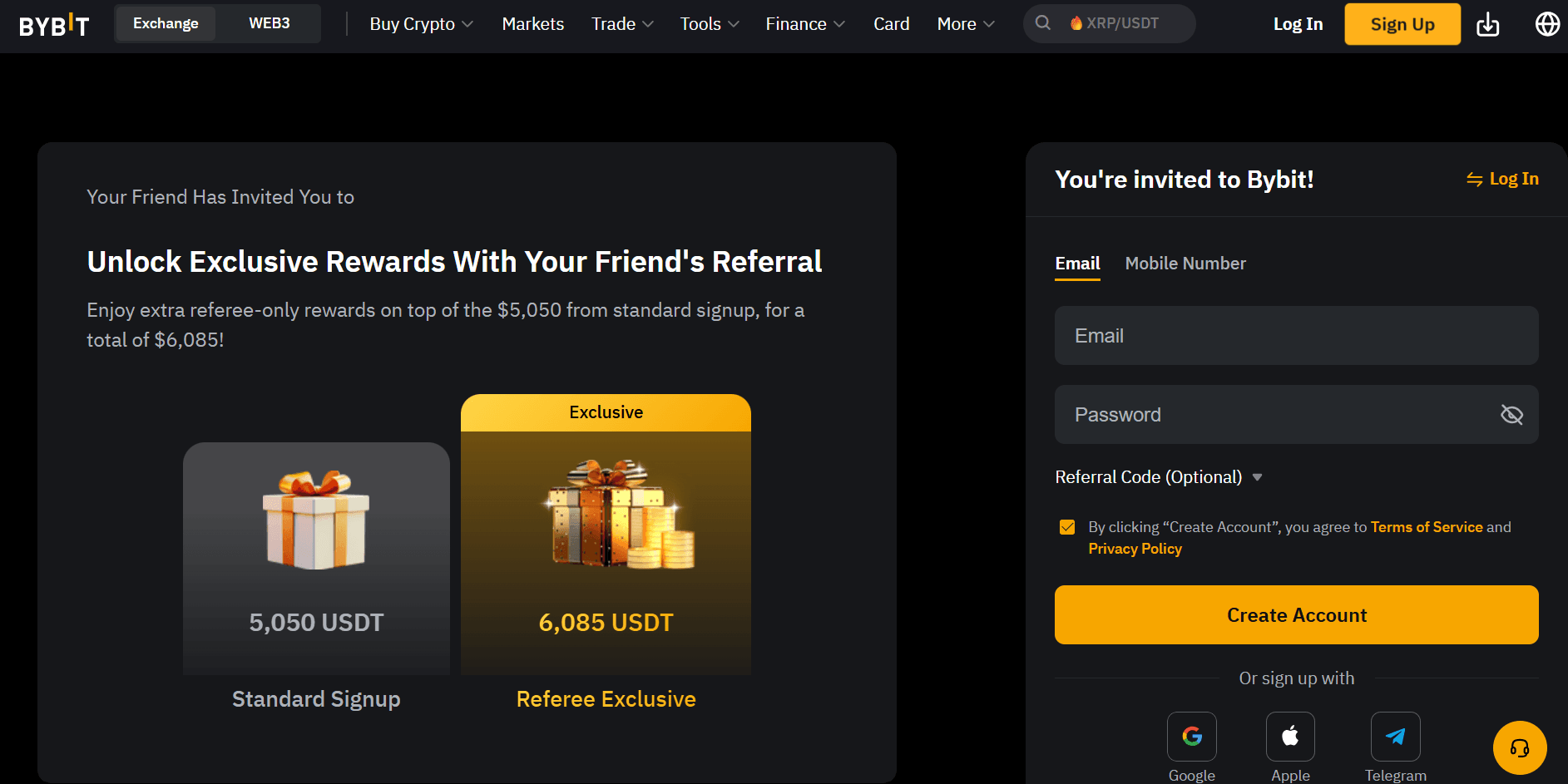 Bybit Excels in High-Leverage Derivatives and a Seamless Copy Trading Platform. Image via Bybit
Bybit Excels in High-Leverage Derivatives and a Seamless Copy Trading Platform. Image via BybitFeatures
- Perpetual Futures and Options with High Leverage: Bybit specializes in leveraged trading, offering up to 100x leverage across its suite of futures and options contracts.
- Social Trading via Built-in Copy Trading System: Users can follow top-performing traders automatically, mirroring strategies without actively managing positions. Explore more about copy trading on Bybit in our guide to crypto copy trading best practices.
- Staking for Passive Rewards: Bybit Earn allows users to stake assets for variable returns, including both flexible and fixed-term products.
- Trading Bot Integration: Automated bots are available for spot and derivatives, supporting features like grid trading and DCA.
- User-Friendly Mobile App with Advanced Tools: The mobile app delivers full trading functionality, risk management tools, and real-time performance monitoring.
Fees
- Spot Trading Fees: 0.10% maker / 0.10% taker
- Derivatives Fees: 0.02% maker / 0.055% taker
- Copy Trading Fees: 10% profit share
- Deposit & Withdrawal Fees: Crypto deposits are free; withdrawals vary (e.g., 0.0002 BTC); fiat fees depend on method
- Other Fees: Funding costs for perpetuals, staking service charges, and possible
✅ Pros
- High-leverage derivatives and perpetuals.
- Built-in copy trading for social investing.
- Trading bots are available for both spot and futures.
- User-friendly and responsive mobile app.
❌ Cons
- Limited fiat deposit/withdrawal options.
- Not accessible in some regulated markets.
- Smaller selection of coins compared to top-tier platforms.
- Occasional downtime during major volatility.
Futures and copy traders who want flexible tools, deep markets, and access to automated strategies and social features.
KuCoin
KuCoin is popular among altcoin traders and early adopters. It supports hundreds of tokens, offers advanced bots and automation tools, and allows partial KYC access for casual users. It also includes features like lending and launchpads for users exploring DeFi and project funding.
For explorers looking beyond the big names, our KuCoin review has everything you need.
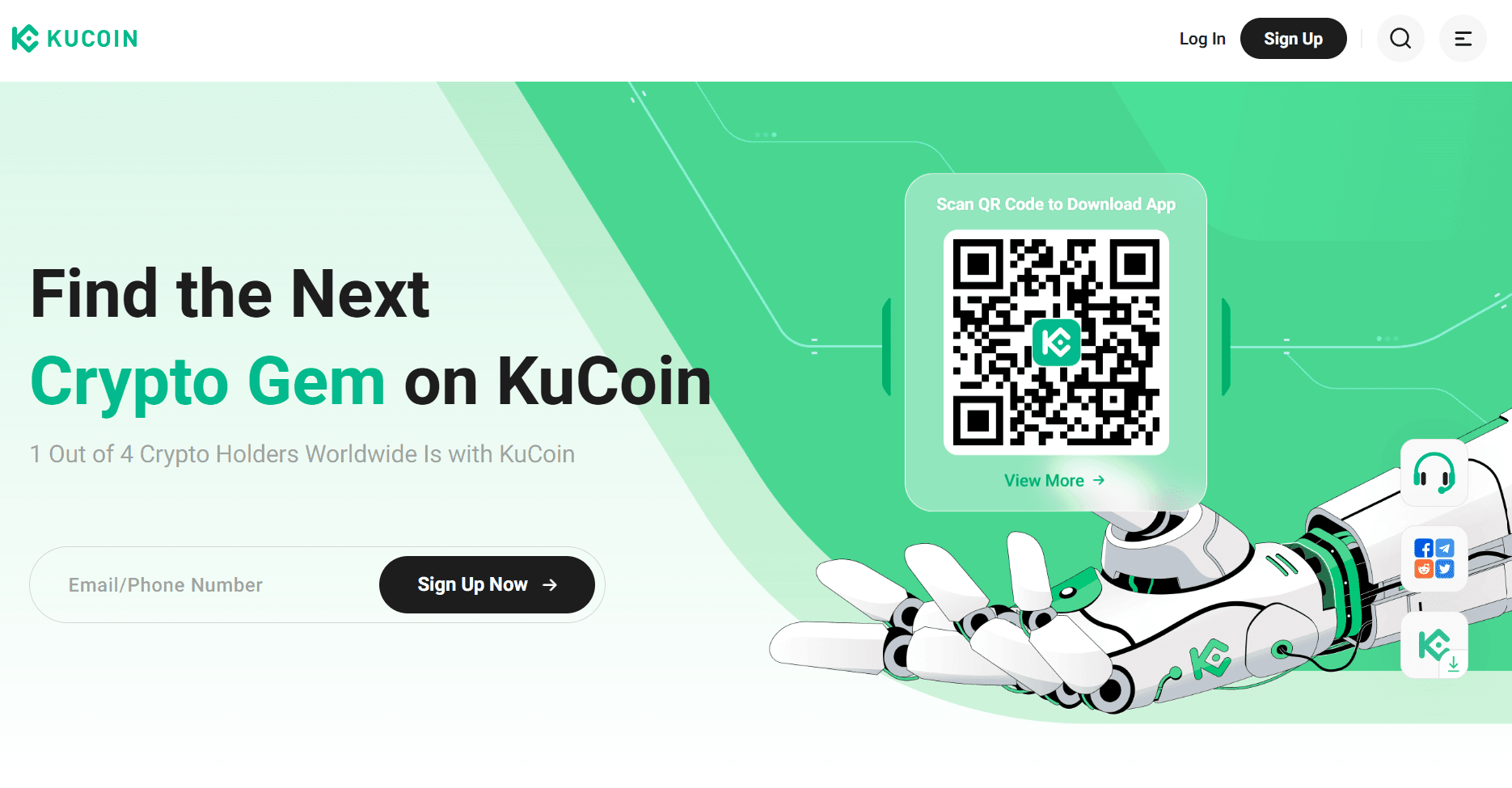 KuCoin Stands Out for Its Huge Altcoin List, Built-In Bots, and User-Friendly Features. Image via KuCoin
KuCoin Stands Out for Its Huge Altcoin List, Built-In Bots, and User-Friendly Features. Image via KuCoinFeatures
- Over 700 Listed Assets: KuCoin has one of the broadest altcoin selections available, ideal for users seeking exposure to emerging or regional projects.
- Built-in Bots for DCA, Grid, and Arbitrage: The platform includes free-to-use bots for strategy automation, suitable for both passive investors and advanced traders.
- Partial KYC for Fast Onboarding: New users can begin trading with basic verification and upgrade later, making entry into the platform more accessible.
- Staking and Lending Options: Users can earn interest through flexible staking, peer-to-peer lending, or KuCoin’s Earn suite of DeFi products.
- Community Programs, Trading Competitions, and Launchpads: KuCoin regularly hosts events and token launches that provide early access and incentives for active users.
Fees
- Spot Trading Fees: 0.10% maker / 0.10% taker (lower with KCS token)
- Derivatives Fees: 0.02% maker / 0.06% taker
- Copy Trading Fees: 10%–18% profit share
- Deposit & Withdrawal Fees: Free crypto deposits; withdrawals vary; fiat access limited
- Other Fees: Margin interest, conversion spreads, and bot usage are free
✅ Pros
- Access to 700+ altcoins and niche tokens.
- Supports multiple trading bots for free.
- Partial KYC allows fast onboarding.
- Active launchpad and community-driven events.
❌ Cons
- Limited fiat integration compared to competitors.
- Regulatory structure not as robust as Western exchanges.
- Interface may feel cluttered to beginners.
- Customer support can be slow during peak times.
Users seeking access to new tokens, automation features, and early-stage DeFi opportunities with flexible identity verification.
Kraken
Kraken focuses on regulation and security, making it a trusted exchange for institutions and users who value transparency. Its services include spot and futures trading, margin options, and educational tools, though it offers fewer coins than other platforms.
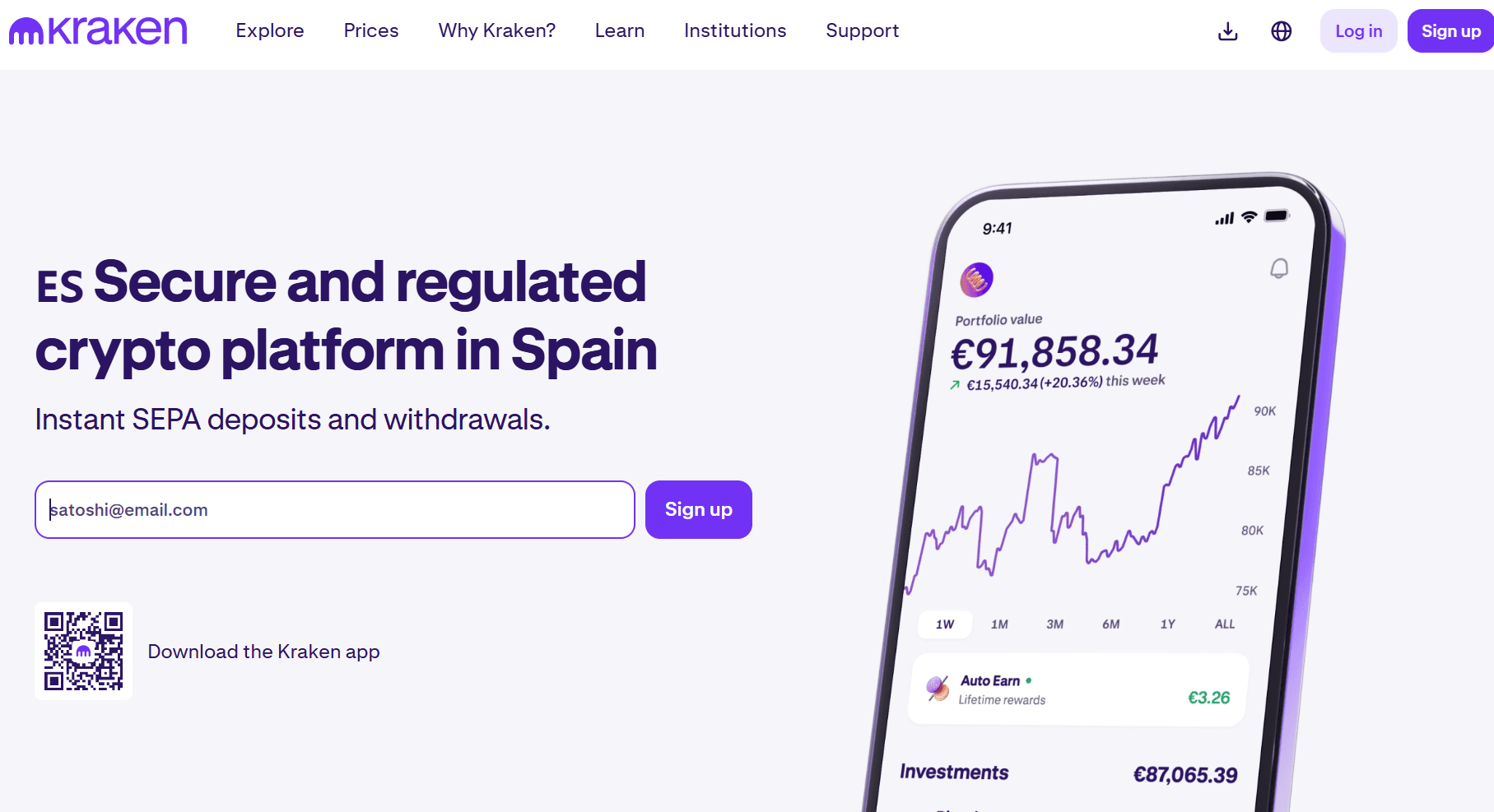 Kraken Combines Institutional-Level Security with a Transparent, Regulated Trading Environment. Image via Kraken
Kraken Combines Institutional-Level Security with a Transparent, Regulated Trading Environment. Image via KrakenFeatures
- Licensed in Major Jurisdictions (US, EU, etc.): Kraken is fully regulated in several countries, offering peace of mind for traders seeking legal and compliant operations.
- Offers Spot, Margin, and Futures Markets: The platform includes a solid mix of trading options, with moderate leverage and professional-grade execution.
- Public Proof-of-Reserves Audits: Kraken performs and publishes regular audits to prove user funds are fully backed and safely stored.
- Rich Educational Content: The exchange provides articles, webinars, and tutorials to help users understand crypto markets and trading strategies.
- Live Customer Support and Phone Service: Kraken offers 24/7 chat and optional phone support, which sets it apart in customer service responsiveness. Kraken’s record in regulation and security makes it a standout from other platforms.
See our detailed Kraken review for a pro’s perspective.
Fees
- Spot Trading Fees: 0.16% maker / 0.26% taker
- Derivatives Fees: 0.02% maker / 0.05% taker
- Deposit & Withdrawal Fees: Free crypto deposits; variable withdrawals (e.g., 0.00015 BTC); fiat fees $0–$35
- Other Fees: Staking fees and margin interest are possible
✅ Pros
- Regulated and licensed in major jurisdictions.
- Offers proof-of-reserves for user trust.
- Good range of trading options (spot, margin, futures).
- Strong educational resources and support.
❌ Cons
- Smaller coin selection than competitors.
- KYC mandatory for all users.
- Interface may lack some customization features.
- Fiat transactions may incur higher fees depending on method.
Traders and institutions who prioritize platform transparency, regulated access, and long-term security.
Coinbase (Advanced Trade)
Coinbase, one of the largest crypto exchanges in the world, is one of the most preferred platforms by users in the U.S. due to its regulatory status and easy onboarding. While it doesn’t offer as many coins or features as other platforms, it provides a clean user experience and insured asset custody.
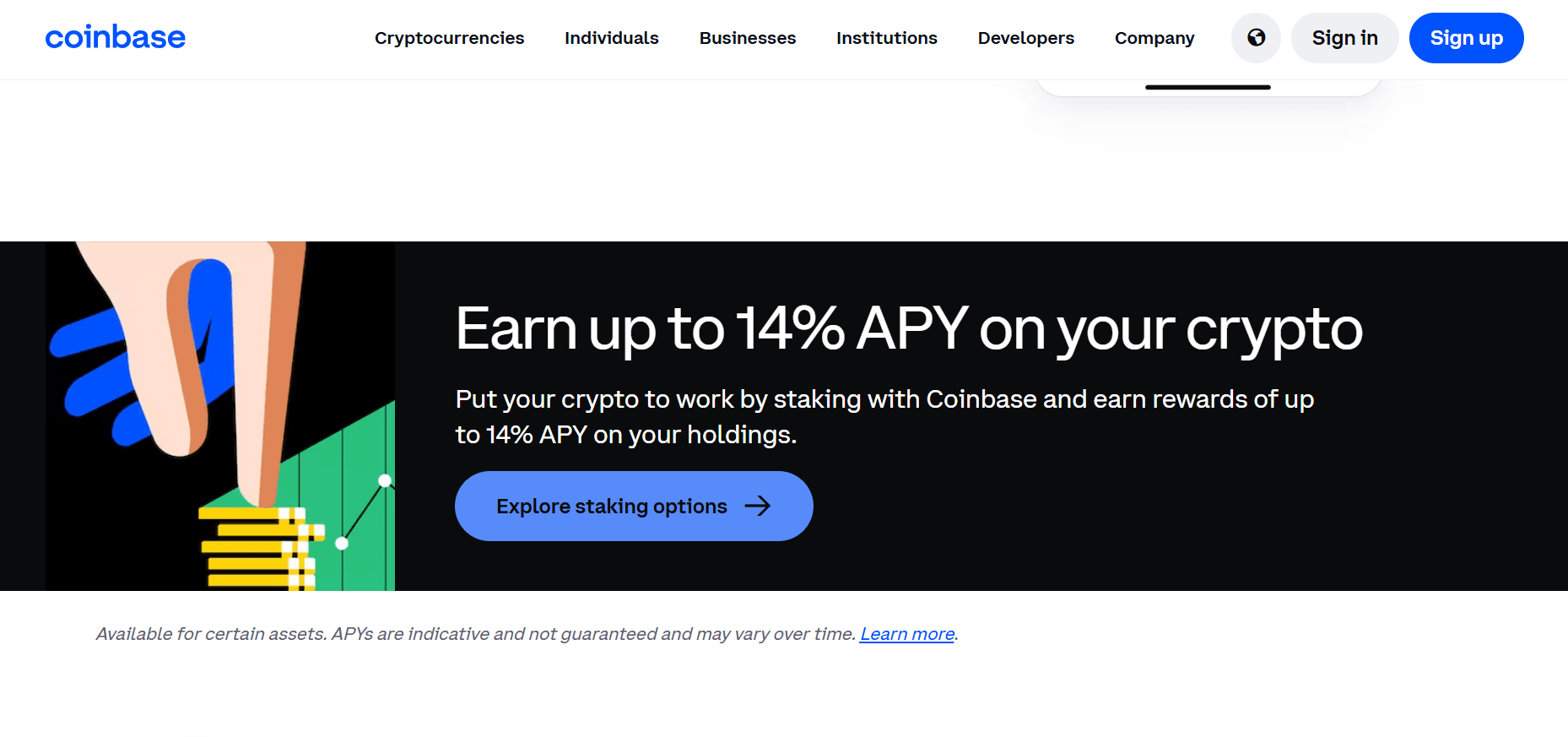 Coinbase Focuses on Regulatory Compliance, User-Friendly Onramps, and Strong Asset Protection. Image via Coinbase
Coinbase Focuses on Regulatory Compliance, User-Friendly Onramps, and Strong Asset Protection. Image via CoinbaseFeatures
- Simple Fiat On/Off Ramp with USD, EUR, GBP: Users can fund accounts easily via bank transfers, cards, or ACH, making it simple to move money in and out.
- Beginner and Pro Interfaces: The main app caters to new users, while Advanced Trade provides a more feature-rich interface for active traders.
- Advanced Trade with Improved Pricing and Tools: The pro platform offers reduced fees, depth charts, limit orders, and candlestick charts for precision trading.
- Educational Platform with Crypto Rewards: “Learn and Earn” tasks let users gain knowledge while receiving small crypto incentives for completing tutorials.
- Insured Custodial Wallets: Digital assets held on Coinbase are insured against breaches, offering institutional-grade storage and safety.
Take a look at details of Coinbase platform, its fees, security, and the full user experience in our article.
Fees
- Spot Trading Fees: 0.40% maker / 0.60% taker (lower with volume)
- Derivatives Fees: Same as spot (limited contracts)
- Deposit & Withdrawal Fees: Crypto deposits free; withdrawals include network fees (e.g., 0.0005 BTC); fiat fees range $0–$10
- Other Fees: Conversion fees up to 2%; staking service takes a cut of rewards
✅ Pros
- Fully regulated in the U.S. and widely trusted.
- Easy fiat on/off ramps with multiple currency support.
- Beginner-friendly and clean interface.
- Assets insured while held in custody.
❌ Cons
- High base fees for small or infrequent trades.
- Fewer trading pairs and tools than other pro platforms.
- Limited access to DeFi or emerging token ecosystems.
- Rewards from staking may include service fees.
U.S. residents and new crypto users who value regulation, insurance, and a frictionless user interface.
OKX
OKX is a crypto exchange that offers spot, futures, options, and copy trading. It also has a built-in wallet for using DeFi apps, trading NFTs, and joining token launches. It’s a good choice for users who want both standard trading tools and access to Web3.
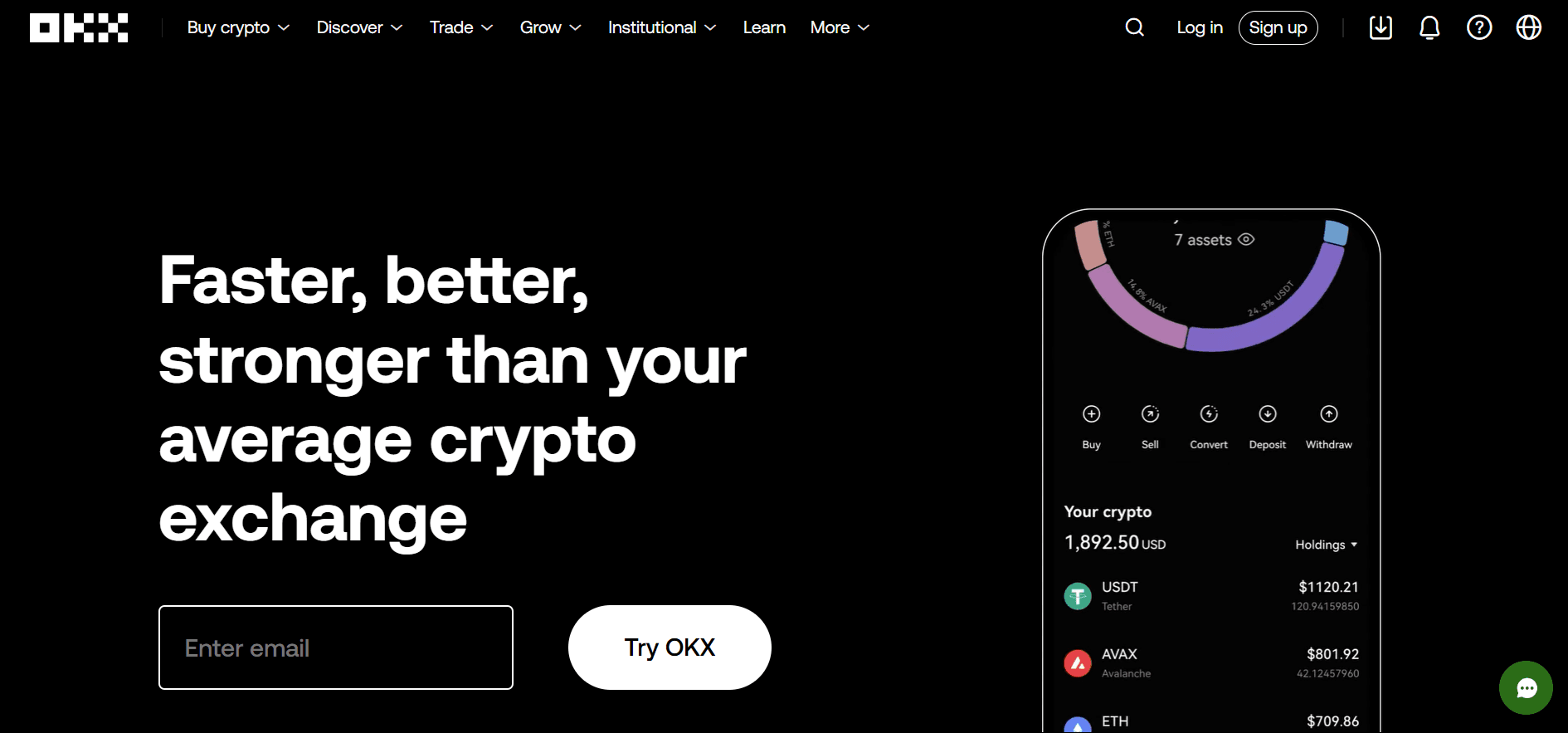 OKX Features Range from Advanced Trading Tools to DeFi Integration and an NFT Marketplace. Image via OKX
OKX Features Range from Advanced Trading Tools to DeFi Integration and an NFT Marketplace. Image via OKXFeatures
- Spot, Futures, Options, and Copy Trading: OKX provides a wide selection of trading instruments across centralized and decentralized markets.
- Integrated Web3 Wallet for DeFi, NFTs, and Launchpads: Users can directly interact with DeFi protocols, participate in token sales, or access NFTs through their OKX Wallet.
- Access to Token Sales and Early Listings: The platform gives early-stage access to new projects, allowing users to participate in flash sales and staking events.
- Social Trading Insights and Risk Management Tools: OKX includes trader leaderboards, analytics, and community signals to support informed decision-making.
- Mining Pools and Staking Options: Users can delegate assets to mining pools or stake tokens through OKX’s Earn section to generate yield.
DeFi meets CeFi at OKX. Discover the full ecosystem in our OKX review.
Fees
- Spot Trading Fees: 0.08% maker / 0.10% taker (lower for OKB holders)
- Derivatives Fees: 0.02% maker / 0.05% taker
- Copy Trading Fees: ~10% profit share
- Deposit & Withdrawal Fees: Free crypto deposits; withdrawals vary; fiat fees vary by method
- Other Fees: Fees on staking/earn products, some conversion costs
✅ Pros
- Supports both centralized and decentralized tools.
- Integrated Web3 wallet for NFTs and DeFi access.
- Advanced analytics, social trading, and risk tools included.
- Wide asset support with early access to token launches.
❌ Cons
- Can be complex for beginners due to product variety.
- KYC needed for most advanced features.
- Some tools and staking products carry performance fees.
- Interface may feel dense without prior experience.
Traders who want access to both exchange tools and Web3 assets in one unified platform.
Bitfinex
Bitfinex is focused on experienced and institutional traders. It offers advanced order types, deep liquidity, and access to margin lending and borrowing. Its fiat support and API integration also appeal to developers and quant traders.
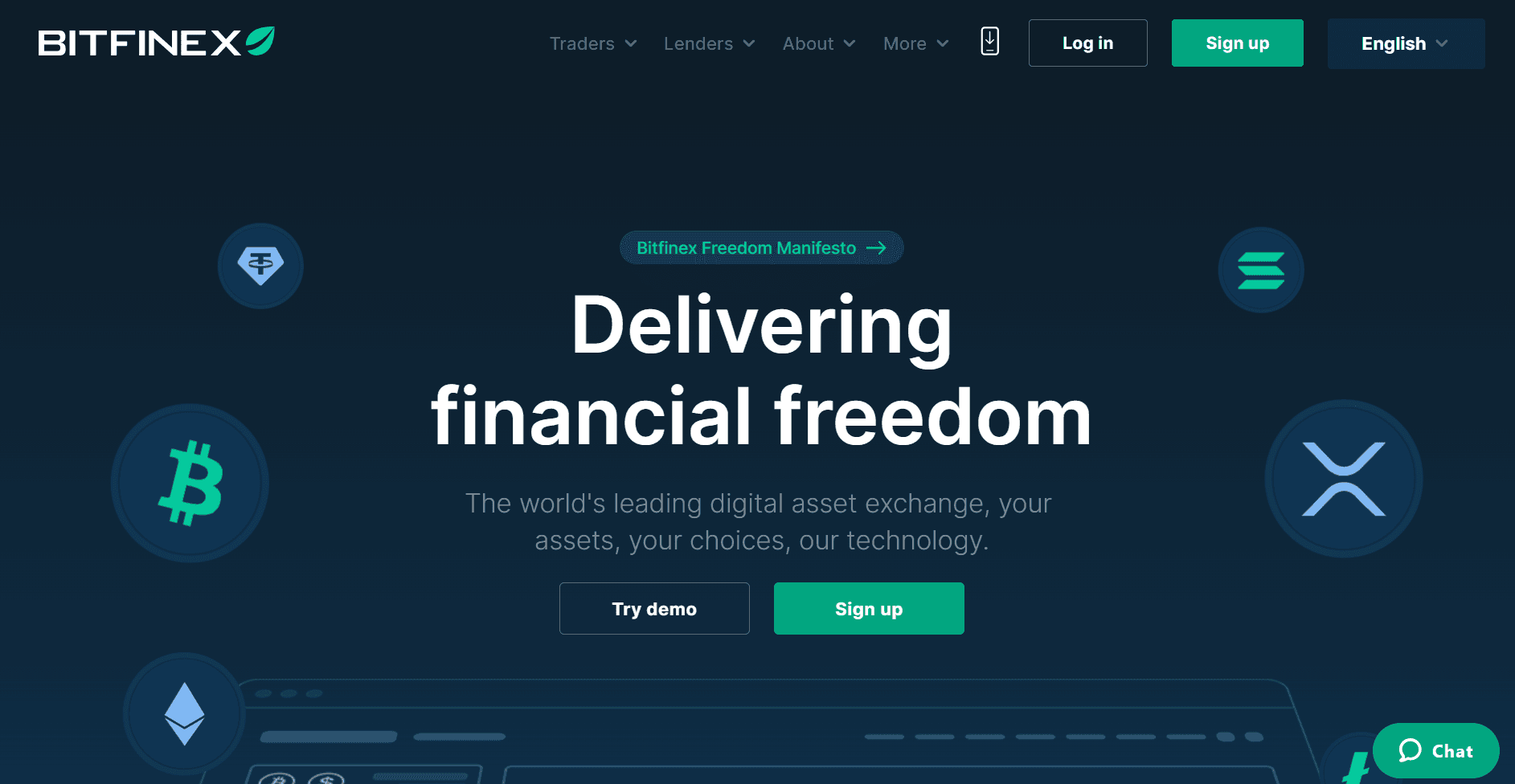 Bitfinex Delivers Deep Liquidity, Powerful Margin Tools, and Flexible Lending Markets. Image via Bitfinex
Bitfinex Delivers Deep Liquidity, Powerful Margin Tools, and Flexible Lending Markets. Image via BitfinexFeatures
- Spot, Margin, and Derivatives Markets: Bitfinex supports high-volume spot and futures trading with access to complex order types and leverage.
- Customizable APIs and Trading Infrastructure: Institutional traders and developers can create algorithmic strategies or manage large portfolios via custom API endpoints.
- Deep Liquidity in BTC, ETH, and Major Stablecoins: Bitfinex is known for strong liquidity in major pairs, supporting efficient execution even at higher trade volumes.
- Multiple Fiat Deposit and Withdrawal Options: The exchange supports USD, EUR, GBP, and other major currencies through wire transfers and other channels.
- Staking, Lending, and Interest Products: Users can earn yield through staking or by lending assets to margin traders via the platform’s funding market.
Fees
- Spot Trading Fees: 0.10% maker / 0.20% taker (lower with volume)
- Derivatives Fees: 0.02% maker / 0.065% taker
- Deposit & Withdrawal Fees: Crypto fees vary (e.g., 0.0004 BTC); fiat wire costs around $60
- Other Fees: Lending/margin interest, inactivity charges may apply
✅ Pros
- Highly customizable API for algorithmic trading.
- Excellent liquidity on major pairs like BTC and ETH.
- Offers margin lending and derivatives for advanced users.
- Supports multiple fiat currencies for deposits and withdrawals.
❌ Cons
- Complex UI not suited to beginner traders.
- History of past security breaches.
- $60 fiat withdrawal fee may deter small investors.
- Customer onboarding and support are slower than competitors.
Professional traders managing large volumes or building automated systems who need liquidity, custom access, and detailed tools.
Bitstamp
Bitstamp is one of the oldest crypto exchanges, known for its simple interface, regulation, and fiat compatibility. It doesn’t offer as many tokens or features, but it remains a strong choice for those seeking straightforward crypto access.
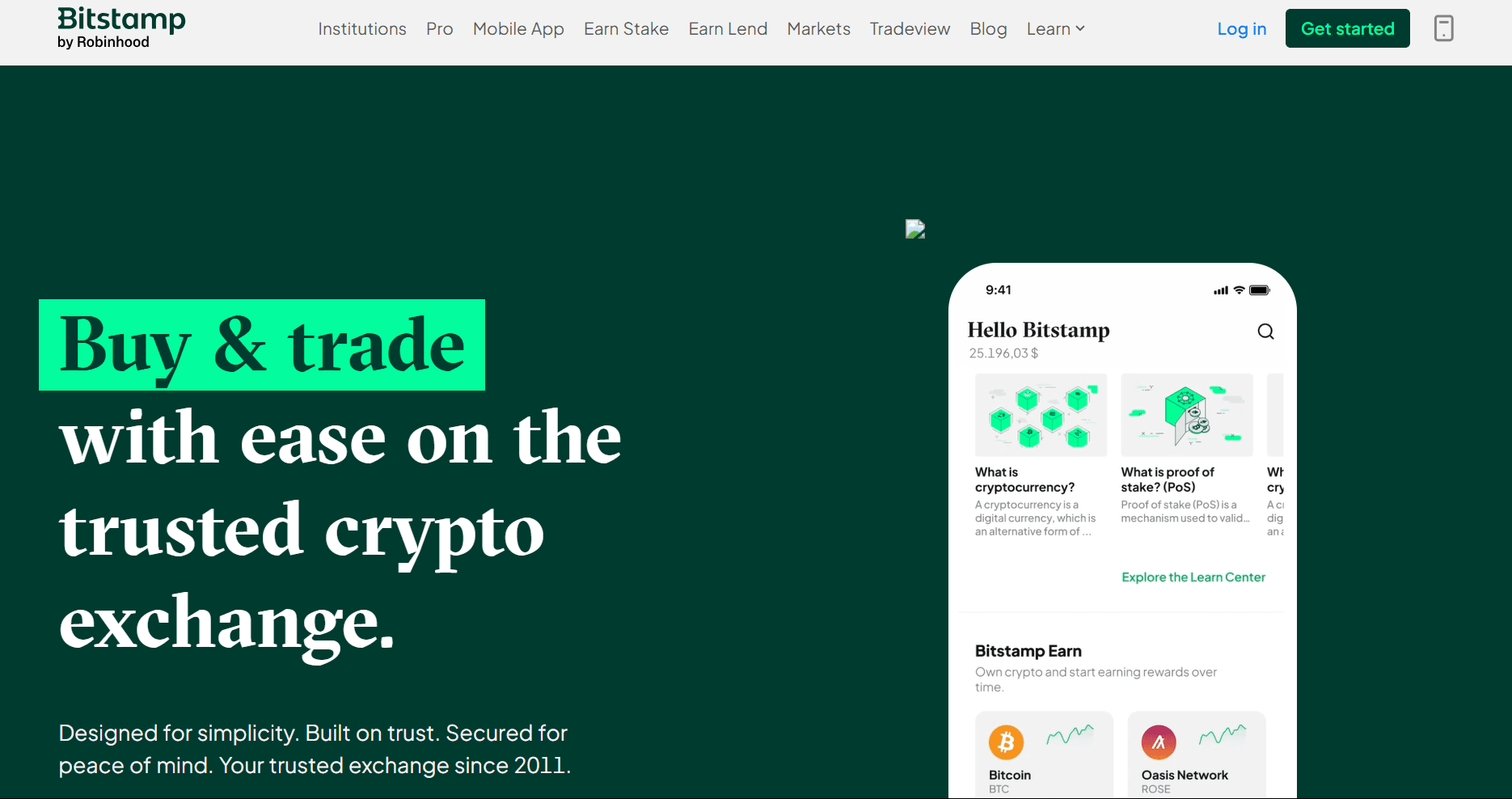 Bitstamp Is Renowned for Its Simple Interface, Strong Fiat Support, and Regulatory Track Record. Image via Bitstamp
Bitstamp Is Renowned for Its Simple Interface, Strong Fiat Support, and Regulatory Track Record. Image via BitstampFeatures
- Licensed in U.S. and EU: As one of the first regulated exchanges in the space, Bitstamp operates under well-established financial oversight.
- Clean UI with Low Learning Curve: The interface is minimalistic and easy to navigate, ideal for beginners or traditional investors.
- Fast Fiat Deposits and Withdrawals: Users can fund accounts via SEPA, ACH, or wire transfers, with fast turnaround times for most fiat methods.
- Limited Staking and Earn Options: Bitstamp offers basic staking support for select tokens, with rewards credited directly to user accounts.
- Focus on Account Security and Transparency: The platform prioritizes user safety with cold storage, compliance controls, and detailed reporting tools.
Fees
- Spot Trading Fees: 0.10% flat (up to $10K/month, then volume discounts)
- Deposit & Withdrawal Fees: Crypto fees vary (e.g., 0.0005 BTC); SEPA usually free; others may charge
- Other Fees: Up to 15% fee on staking rewards
✅ Pros
- Regulated and trusted in both EU and U.S. markets.
- Extremely beginner-friendly interface.
- Reliable fiat services, especially for EUR and GBP.
- Transparent operational history with strong compliance.
❌ Cons
- Very limited asset selection compared to newer exchanges.
- Few advanced tools or automation features.
- Earn/staking service charges up to 15% on rewards.
- Lacks support for DeFi and Web3 tools.
Investors prioritizing fiat access and long-term account safety over the latest features or tokens.
See why Bitstamp is favored for fiat onramps and ease in our comprehensive Bitstamp overview.
Deribit
Deribit specializes in BTC and ETH derivatives. It offers high-speed trading, reliable execution, and detailed options tools for advanced users. Although it doesn't support spot trading or altcoins, it is considered the most reliable venue for crypto options.
If you are serious about crypto options and pro-level derivatives trading, then read about Deribit in our full review.
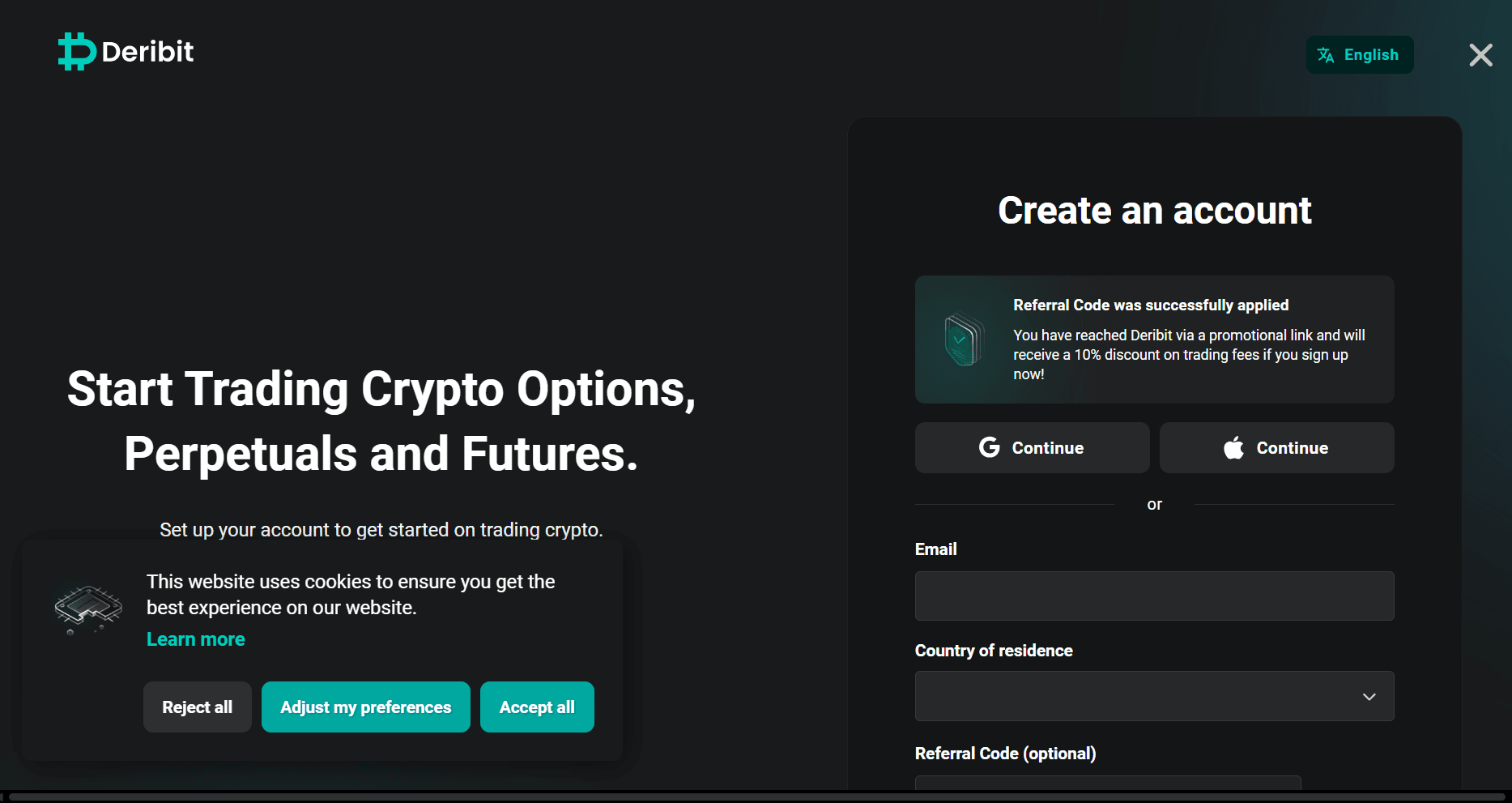 Deribit Leads in BTC and ETH Options Trading with a High-Speed, Pro-Level Interface. Image via Deribit
Deribit Leads in BTC and ETH Options Trading with a High-Speed, Pro-Level Interface. Image via DeribitFeatures
- Perpetual and Options Markets for BTC and ETH: Deribit specializes in a narrow but high-volume product suite, offering precision tools for derivatives traders.
- Up to 100x Leverage on Futures: Advanced users can access significant leverage for directional trades or hedging, with real-time margin controls.
- Institutional-Grade Margin and Liquidation Engine: The platform is designed for professional use, with rapid execution, cross-margin, and post-trade analytics.
- API Support for Algo Trading: Quantitative traders can integrate directly with Deribit’s engine for low-latency, high-frequency execution.
- Real-Time Risk Management: Deribit provides real-time portfolio metrics and P&L tools, helping traders manage positions effectively.
Fees
- Derivatives Fees: 0.02% maker / 0.05% taker (perpetuals); 0.03% per options contract
- Deposit & Withdrawal Fees: Free deposits; withdrawals: 0.0005 BTC / 0.01 ETH
- Other Fees: Possible liquidation penalties and gas costs
✅ Pros
- Deep liquidity in BTC and ETH options markets.
- Offers up to 100x leverage with tight spreads.
- Institutional-grade trading engine with real-time risk metrics.
- Highly stable and reliable performance under load.
❌ Cons
- No support for spot trading or altcoins.
- Only supports BTC and ETH, has very limited asset scope.
- KYC required for withdrawals and larger volume activity.
- Penalties may apply during liquidation events.
Experienced traders focused on BTC/ETH options and perpetuals who need speed, reliability, and fine control over execution.
dYdX
dYdX is a decentralized exchange offering non-custodial perpetual trading. With on-chain transparency and wallet-based access, it’s designed for users seeking privacy, control, and KYC-free trading.
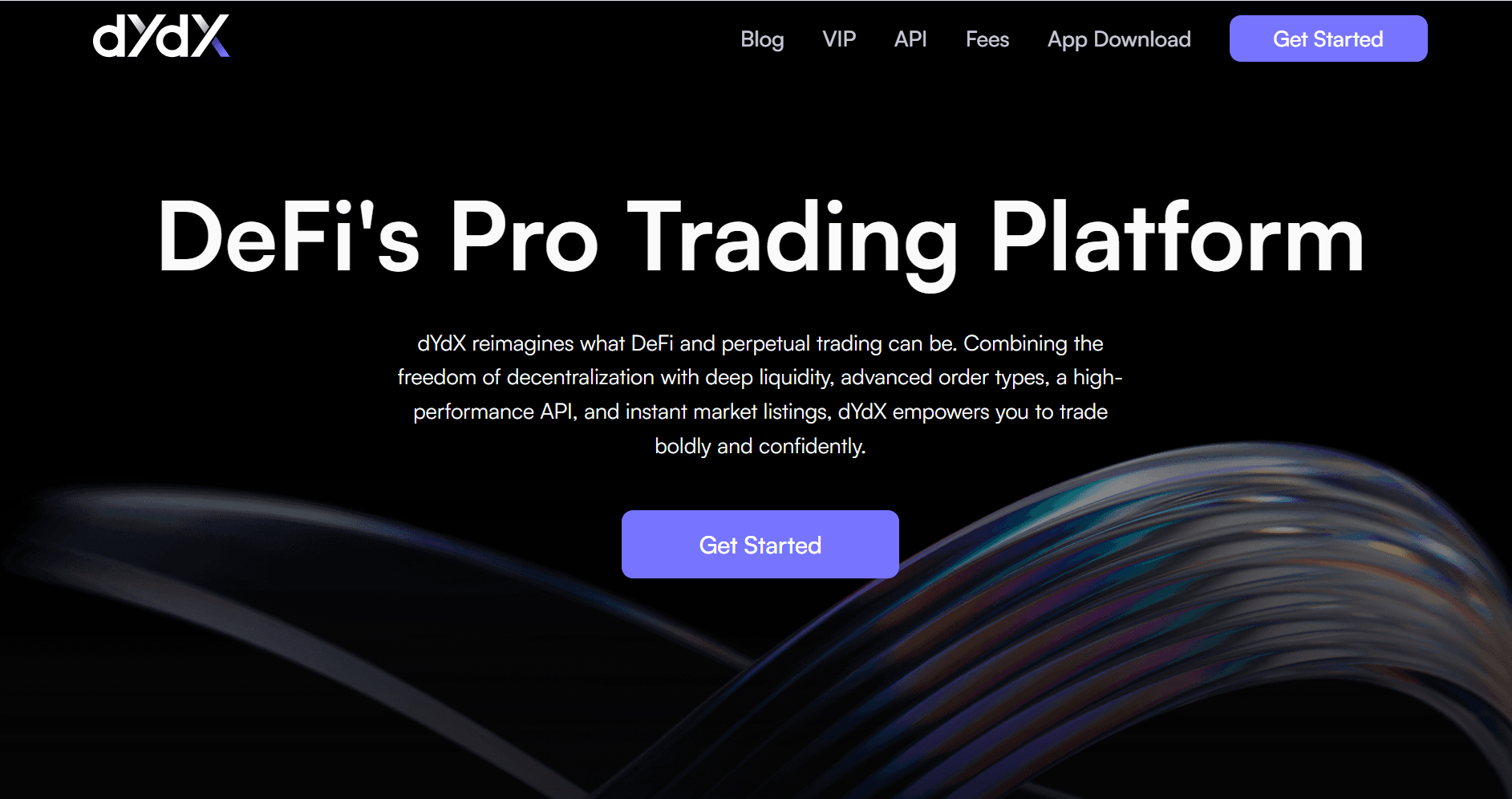 dYdX Enables On-Chain Perpetuals and Full User Control for Non-Custodial Crypto Trading. Image via dYdX
dYdX Enables On-Chain Perpetuals and Full User Control for Non-Custodial Crypto Trading. Image via dYdXFeatures
- On-Chain Perpetual Trading: dYdX offers non-custodial perpetuals for top cryptocurrencies, allowing users to trade without handing over control of their funds.
- Funds Remain in the User’s Wallet: Users maintain full ownership of their assets throughout, reducing counterparty risk and improving security.
- Up to 20x Leverage on Major Assets: Traders can use moderate leverage while retaining the benefits of decentralization and wallet-based access.
- No Centralized Custody or KYC: The platform requires no personal data to begin trading, giving full privacy and permissionless access. Explore the future of permissionless trading with our deep dive into decentralized exchanges and how platforms like dYdX are changing the landscape.
- Open Access Globally via Compatible Wallets: Anyone with a supported crypto wallet can use dYdX, making it accessible across nearly all regions.
Fees
- Derivatives Fees: 0.05% maker / 0.20% taker (discounts for high-volume users)
- Deposit & Withdrawal Fees: Only gas fees for on-chain transfers
- Other Fees: L2 or Ethereum gas; possible rebates for liquidity providers
✅ Pros
- Fully non-custodial with wallet-based access.
- Privacy-first: no KYC or identity required.
- On-chain transparency with verifiable balances.
- Decentralized and censorship-resistant infrastructure.
❌ Cons
- Requires knowledge of wallets and gas fees.
- Limited asset availability compared to centralized exchanges.
- User must manage their own keys and transaction safety.
- Interface may be unintuitive for new users.
Traders who value decentralization, global access, and full custody of their funds without needing to register on a centralized platform.
Final Thoughts
At the end of the day, the most important question isn’t whether Bitget is good or not; it’s whether it’s good for you. And that answer can change over time. What once felt like the right fit might now feel restrictive, clunky, or out of sync with how you trade.
Maybe you want a platform with more altcoin support. Maybe you need tighter spreads. Or maybe you just want a mobile app that doesn’t lag when the market moves. Whatever the reason may be, know this: Switching exchanges isn't a step backward; it's a step toward something better aligned with your style and goals.
If Bitget was your launchpad into crypto, great. Now it’s time to decide what kind of trader you’re becoming and which platform can help you grow into that role.
Also Read





